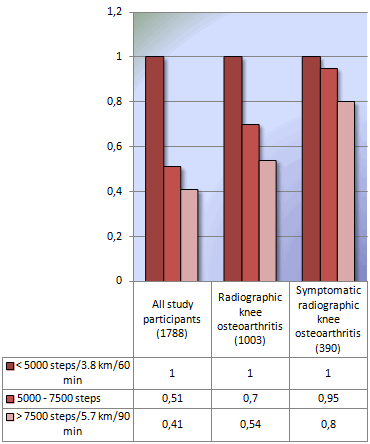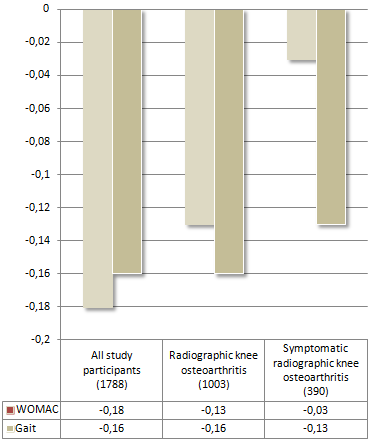|
Definition: "An ergogenic aid is any substance or phenomenon that enhances performance "
|
|
||||||||
10.12.2014 |
|
|
Walking protects knees from osteoarthritis
People who have osteoarthritis in their knees can delay the course of their disease by moving more. This is suggested in an epidemiological study that researchers at Boston University published in Arthritis Care & Research. The idea that exercise causes the cartilage in joints to wear down in people with arthritis, and that they should therefore should not do anything to put pressure on their joints, is not entirely correct.
Osteoarthritis
Doctors used to regard osteoarthritis as a disease of aging about which little could be done, but more recent research has shown that people who develop arthritis are genetically predisposed to this.
Study
1003 of the participants already had knee problems that were visible on scans [Radiographic knee osteoarthritis]. Of this group 390 participants already actually had symptoms [Symptomatic radiographic knee osteoarthritis].
The researchers followed the subjects for two years, and recorded how the arthritis developed in their knees. The researchers also recorded the amount of light to moderately intense exercise that the participants did: they all wore a pedometer that counted the number of steps they walked each day. 1000 steps = 760 m = 12 minutes [for people not engaged in sports].
Results
Rheumatologists use WOMAC-scores to express the extent to which people's functioning decreases as a result of arthritis. Exercise reduced the likelihood of a less favourable WOMAC-score.
As far as the researchers could see, 7500 steps or about 6 km of walking a day provides the knee joint with optimal protection. This figure was for the total amount of walking in a day: so it included walking up and downstairs at home, doing shopping and walking the dog.
The figure below shows that every 1000 steps taken daily reduced the participants’ chance of decline by 16-18 percent.
Conclusion
Source:
More: |
|




